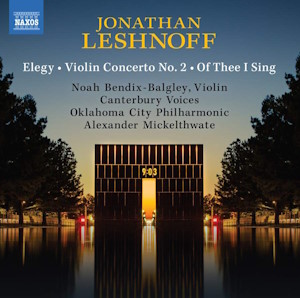
Jonathan Leshnoff (b. 1973)
Elegy (2022)
Violin Concerto No. 2 (2017)
Of Thee I Sing (2020)
Noah Bendix-Balgley (violin)
Canterbury Voices
Oklahoma City Philharmonic/Alexander Mickelthwate
rec. live, March & May 2022, Oklahoma City, USA
First recordings
Naxos 8.559927 [56]
Jonathan Leshnoff’s music has in recent years been receiving a fair amount of admiring attention on this website, with reviews from my colleagues of his Third Symphony and Piano Concerto (review ~ review ~ review) and Fourth Symphony (review), plus two in-depth interviews with the composer (2021 ~ 2023).
This is the fifth album from Naxos devoted to his music; its themes, according to the reverse cover, are “remembrance, memorialization, and hopefulness”. The Second Violin Concerto is “inspired by Jewish mysticism” and played by soloist Noah Bendix-Balgley, North Carolina-born First Concertmaster of the Berlin Philharmonic; the Elegy “is written in memory of the thousands of nameless people who suffered under oppression.” Of Thee I Sing was commissioned by the conductor here to commemorate the 25th anniversary of the Oklahoma City bombing atrocity.
Sombre stuff, then, but relieved by conclusions which, in the composer’s words, aim to be “symbolic of the hope that has emerged through the dark, discordant eras of history.”
The music is far removed from the persistent atonalism and dissonance some might associate with modern and post-modern music. The Elegy opens with an octave leap similar to Wagner’s Siegfried Idyll and a yearning, melancholy mood close in affect to Barber’s Adagio for Strings. The prominence of the harp in the soundscape, entering early and set against lush string scoring, means that the work immediately flirts with a certain sentimentality, and the melody, while sweet and soaring, is not especially memorable, so when it is echoed by the cellos there is no special thrill of recognition. To my ears it remains rather vague and generic in impact – inoffensively pleasant, one might say. Nothing about the performance suggests that it was recorded live and it is impeccably executed.
The Second Violin Concerto opens with a restless, driven movement oddly designated as “Broad”, which suggests a rather more leisurely treatment than it here receives; its moto perpetuo propulsion is compelling and surely compulsory and Bendix-Balgley brings a virtuosic bite and beauty to the solo violin’s insistent narrative. The Adagio second movement, subtitled “Chokhmah Yud” – “the unknown, mysterious genesis of any creative idea” – is spare and haunting, then rhapsodic. The brief, spiky Scherzo is reminiscent of Shostakovich in its desperate levity, the finale is similarly frantic and neurotic, demanding considerable stamina and dexterity from the soloist. This is never routine or boring music but reeks of passion and commitment both on the part of the composer and the performers.
As much as I enjoy the concerto, the choral and symphonic single-movement Of Thee I Sing, although of similar duration feels like the central work here. Its insistent, almost hysterical opening, spanning almost five minutes, makes a stark contrast with the slow, chorale-like second section and the splashes of colour when the harps intervene are very effective. The return of pounding opening theme at 7:49 over the droning basses is highly dramatic and there is much in evidence a kind of animal energy both intrinsic to the music and infused into it by the zeal of the conductor and orchestra. The surprise comes two-thirds of the way through the piece at 14:43 with the entry of the choir singing Samuel Francis Smith’s 1831 poem “America” to Leshnoff’s adaptation of the music known in the United States as “My Country, ’Tis of Thee” and in the UK as “God Save the King”. Apparently, the composer agonised about what text and tune to choose; reactions will vary as to the aptness of those choices, especially for British listeners with different associations to the music, while the American audience will have to decide whether its use is ironic, consolatory, or perhaps both in turn. It is handled in a stately, impressive manner and builds to a magnificent climax, the choir singing out bravely. I wonder whether ultimately the borrowing is a rather facile strategy but when sung with such massive dignity I think it works and Leshnoff’s dark colouring of the instrumentation prevents it sounding glib; there is always a sober, sombre sadness about it, reminding the listener of the horror which prompted this act of remembrance and expression of resilience. It’s a pity that the strings in the closing chords are a little unsteady, but let that pass; in general, the playing is admirable.
The sound throughout is first-rate – really vivid. Some might find Leshnoff’s music as a whole retrograde, too simplistic and depicted in primary colours – perhaps even hurl the ultimate insult of “film music”; others will revel in its unashamedly Romantic indulgence and accessibility. I am inclined to the latter response with certain reservations.
Ralph Moore
Help us financially by purchasing from



Recording details
22 May 2022, Visual & Performing Arts Center, Oklahoma City Community College (Elegy); 4-5 March 2022, Thelma Gaylord Performing Arts Theater, Civic Center Music Hall, Oklahoma City.


















